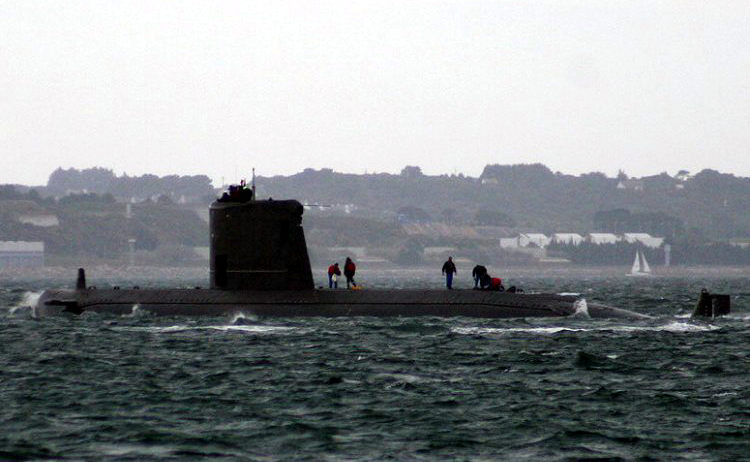- Joined
- 15 July 2007
- Messages
- 4,887
- Reaction score
- 4,552
A good title needed in lew I'll use "benefits of SSNs"
It's a first stab at trying to define what the SSN delivers for a state.
Like all naval ships, the submarine possess a quality of both tactical utility and strategic effect.
At the tactical level, the ability to remain submerged and not reveal itself, coupled with the ability to deliver ship killing 'effectors' (torpedoes and, land attack and Anti-Ship Missiles, mines and special forces), makes this a potent means to dominate the seas and threaten coastal infrastructure.
It's strategic quality is in part the familier 'in being' readiness for action, and the retention of ambiguity in where it may be.
This ambiguity used to be a quality possessed by all ships beyond the sight of land. Essentially their location becomes conjecture and assumption, since it is not verifiable.
With the increasing passage of time the uncertainty of the ships location increases, until it is sighted again or another ship sees it and brings that information back to land.
Modern sensors render the ship's location much more acquire-able in real time. Removing ambiguity.
But the submarine retains this quality. Sonar is much more limited in range than radar or vision. Where an aircraft can be detected hundreds of miles away, a submarine can slip past the mere tens of miles and sometimes a lot closer.
Infamously, the more daring submarine commander has risked detection to take pictures of an opponents ship's propellers. A feat requiring the submarine to risk actual collision.
'In being' is the state of readiness to move, and act. A standing Army possesses this quality as does in it's readiness, a fortress manned and provisioned. As such these forces exert an immediate and continuing pressure to be answered either by manoeuvre or by counter force.
As such the nuclear powered submarine delivers an effect far greater than it's actual capacity. It's stocks of torpedoes and missiles are limited, there is little extra accommodation for passengers.
But the possibility is that these effectors will be applied at key assets an opponent possesses.
Ship(s) so vital to the fleet, or transport laden with crucial asset(s).
The port you cannot afford to have blocked. Infrastructure you cannot have have damaged or destroyed.
Worse that unguarded part of your coast through which agents delivered by submarine might slip unnoticed into your country.
Because the submarine might be anywhere, your only defence is to be strong everywhere and this drains resources away from other tasks.
It's a first stab at trying to define what the SSN delivers for a state.
Like all naval ships, the submarine possess a quality of both tactical utility and strategic effect.
At the tactical level, the ability to remain submerged and not reveal itself, coupled with the ability to deliver ship killing 'effectors' (torpedoes and, land attack and Anti-Ship Missiles, mines and special forces), makes this a potent means to dominate the seas and threaten coastal infrastructure.
It's strategic quality is in part the familier 'in being' readiness for action, and the retention of ambiguity in where it may be.
This ambiguity used to be a quality possessed by all ships beyond the sight of land. Essentially their location becomes conjecture and assumption, since it is not verifiable.
With the increasing passage of time the uncertainty of the ships location increases, until it is sighted again or another ship sees it and brings that information back to land.
Modern sensors render the ship's location much more acquire-able in real time. Removing ambiguity.
But the submarine retains this quality. Sonar is much more limited in range than radar or vision. Where an aircraft can be detected hundreds of miles away, a submarine can slip past the mere tens of miles and sometimes a lot closer.
Infamously, the more daring submarine commander has risked detection to take pictures of an opponents ship's propellers. A feat requiring the submarine to risk actual collision.
'In being' is the state of readiness to move, and act. A standing Army possesses this quality as does in it's readiness, a fortress manned and provisioned. As such these forces exert an immediate and continuing pressure to be answered either by manoeuvre or by counter force.
As such the nuclear powered submarine delivers an effect far greater than it's actual capacity. It's stocks of torpedoes and missiles are limited, there is little extra accommodation for passengers.
But the possibility is that these effectors will be applied at key assets an opponent possesses.
Ship(s) so vital to the fleet, or transport laden with crucial asset(s).
The port you cannot afford to have blocked. Infrastructure you cannot have have damaged or destroyed.
Worse that unguarded part of your coast through which agents delivered by submarine might slip unnoticed into your country.
Because the submarine might be anywhere, your only defence is to be strong everywhere and this drains resources away from other tasks.


